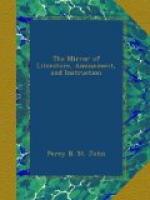To young readers it might be useful to observe, that these verses in one place approach the verge of meaning, but are on the wrong side of the line: to none can it be necessary to say, that they breathe the deep feeling of a mind essentially poetical.
“Her desire of knowledge increased as she grew more capable of appreciating its worth;” and she appreciated much beyond its real worth the advantages which girls derive from the ordinary course of female education. “Oh!” she said one day to her mother, “that I only possessed half the means of improvement which I see others slighting! I should be the happiest of the happy.” A youth whom nature has endowed with diligence and a studious disposition has, indeed, too much reason to regret the want of that classical education which is wasted upon the far greater number of those on whom it is bestowed; but, for a girl who displays a promise of genius like Lucretia, and who has at hand the Bible and the best poets in her own language, no other assistance can be needed in her progress than a supply of such books as may store her mind with knowledge. Lucretia’s desire of knowledge was a passion which possessed her like a disease. “I am now sixteen years old,” she said, “and what do I know? Nothing!—nothing, compared with what I have yet to learn. Time is rapidly passing by: that time usually allotted to the improvement of youth; and how dark are my prospects in regard to this favourite wish of my heart!” At another time she said—“How much there is yet to learn!—If I could only grasp it at once!”
In October 1824, when she had just entered upon her seventeenth year, a gentleman, then on a visit at Plattsburgh, saw some of her verses—was made acquainted with her ardent desire for education, and with the circumstances in which she was placed; and he immediately resolved to afford her every advantage which the best schools in the country could furnish. This gentleman has probably chosen to have his name withheld, being more willing to act benevolently than to have his good deeds blazoned; and yet, stranger as he needs must be, there are many English readers to whom it would have been gratifying, could they have given to such a person “a local habitation and a name.” When Lucretia was made acquainted with his intention, the joy was almost greater than she could bear. As soon as preparations could be made, she left home, and was placed at the “Troy Female Seminary,” under the instruction of Mrs. Willard. There she had all the advantages for which she had hungered and thirsted; and, like one who had long hungered and thirsted, she devoured them with fatal eagerness. Her application was incessant; and its effects on her constitution, already somewhat debilitated by previous disease, became apparent in increased nervous sensibility. Her letters at this time exhibit the two extremes of feeling in a marked degree. They abound in the most sprightly or most gloomy speculations, bright hopes and lively




